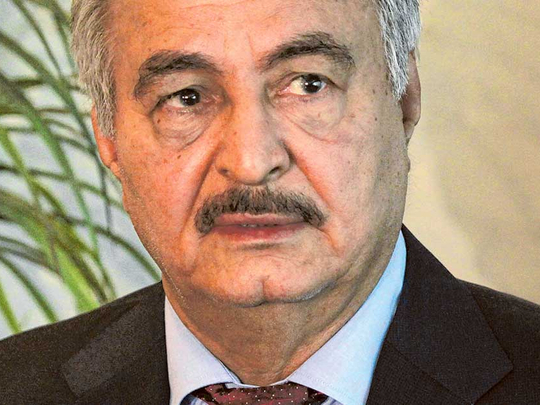
Tripoli: The head of Libya’s UN-backed unity government called for urgent talks on Wednesday after forces loyal to a rival administration seized the main eastern oil ports in defiance of world powers.
The seizure of all four export terminals in the so-called oil crescent was a major blow to Prime Minister Fayez Al Sarraj’s government, which is almost entirely dependent on oil revenues for its income.
Military strongman General Khalifa Haftar on Sunday launched an offensive on Libya’s “oil crescent” along the northern coast.
His forces fought off guards to gain control of the oil terminals at Ras Lanuf, Al Sidra and Zuwaytania, and they finally secured Brega unopposed on Tuesday.
“We have taken control of the Brega port completely and without any fighting,” said Colonel Muftah Al Muqarief, who heads oil guards loyal to Haftar.
“The entire oil crescent region is now under our control,” Al Muqarief said.
Brega was taken largely thanks to “mediation involving residents and town elders”, he said.
Haftar, 73, backs the parliament which has refused to grant the Government of National Accord (GNA) a vote of confidence.
UN envoy Martin Kobler, who had called repeatedly for a halt to the offensive led by Haftar, was to brief the Security Council on the crisis later on Wednesday.
The GNA is the centrepiece of UN efforts to end five years of chaos in Libya since the overthrow of veteran dictator Muammar Gaddafi and it now faces an even tougher battle to assert its authority over the rival administration in the east.
Al Sarraj said that Libya was at a “turning point” after the assault on the oil ports with its future as a united nation in serious question.
“I call on all sides to halt provocative actions and sit down urgently at the same table to discuss a mechanism that would enable us to get out of this crisis and put a stop to the conflict,” the prime minister said.
“I am not prepared to rule one part of Libya nor to lead a war against another part.”
It was the first fighting between the forces of the rival administrations since Al Sarraj established his government in Tripoli in March.
The capture of the oil crescent means that the rival administration now controls virtually all of the eastern Cyrenaica region.
The writ of Sarraj’s government is confined to the western Tripolitania region where its forces have been battling terrorists of Daesh in the coastal city of Sirte for months.
The Petroleum Facilities Guard, which had been responsible for the defence of the oil ports, has played a prominent role in the fighting against Daesh and Haftar’s forces took advantage of the absence of many of its members to seize all four ports in just three days.
Haftar, who sees himself as Libya’s saviour after battling Islamist terrorists out of most of the main eastern city of Benghazi, is the most powerful backer of the eastern administration.
Western governments have voiced serious concern that Libya’s deepening divisions can only play into the hands of the terrorists and their efforts to establish a base in the North African nation just across the Mediterranean from Europe.
The United States and its European allies issued a joint statement condemning Haftar’s offensive and calling for the return of the oil ports to the unity government control.











